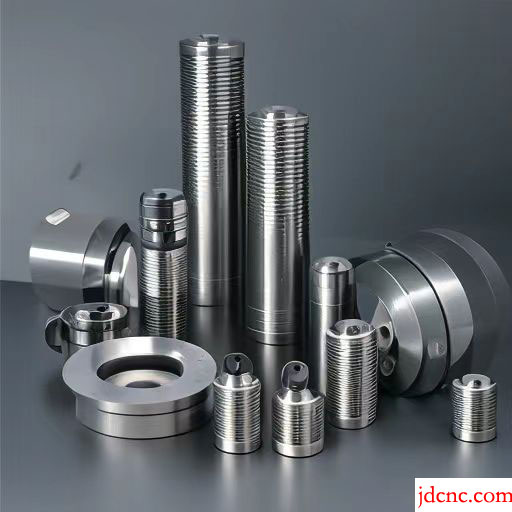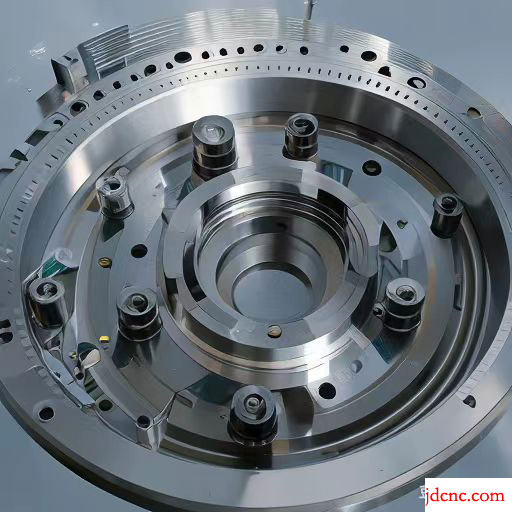What is Titanium?
Titanium is a chemical element that is NO. 22 on the periodic table with an atomic weight of 47.9 The symbol is “Ti”. It is the 9th most abundant element on earth’s crust
Titanium is mined from rutile, ilmenite, and sphene. Titanium is an exotic metal. It has a unique combination of mechanical, chemical, and physical properties. So it has a relatively high price tag and requires special tools to fabricate the metal.
This article will introduce some basics about Titanium, especially in the CNC machining industry, and discuss common uses.

CNC machining titanium company
JD CNC (jdcnc.com) is a Chinese CNC machining titanium company specializing in custom titanium parts.
We own advanced equipment and tooling facilities, skilled machinists, and extensive expertise. We can provide precise titanium machining services and customizing high-quality titanium CNC machining parts. This can meet exact specifications, budgetary requirements, and on-time delivery as per your needs.
In our titanium CNC machining workshop, various processes such as milling, turning, drilling, and more are available, along with excellent surface finishes.
Our range of titanium and titanium alloy components is in various industries and fields. Such as airplane parts and fasteners, gas turbine engines, compressor blades, casings, engine cowlings, and heat shields.
We are dedicated to building close and amicable partnerships with customers from all over the world.
Why Choose Titanium as CNC Machining Parts (Titanium benefits)
The primary benefits of using CNC titanium as a manufacturing material because of its biocompatibility, extensive corrosion resistance, and the highest strength-to-weight ratio among all metals. Additionally, titanium exhibits excellent ductility. It is relatively easy to machine, making it a highly versatile and advantageous material for various manufacturing applications. The main advantages are below:
- High Strength and Low-Density Titanium has the highest strength-to-density ratio of all metals on the periodic table. its strength-to-density ratio is even higher than that of steel. Titanium’s high strength-to-density ratio makes it particularly effective for use in the aerospace manufacturing industry.
- Non-magnetic/Corrosion Resistance Another key advantage of titanium in the manufacturing industry is corrosion resistance. This metal has no magnetic characteristics. It also has excellent oxidation resistance, so making it resistant to corrosive forces.
- Lightweight Titanium weighs less than most other metals and alloys. Titanium is just as strong as steel, but it only weighs about half as much. So, it allows for the construction of strong and lightweight fuselages for airplanes.
- Non-toxic Titanium is corrosion-resistant. It has high bio-compatibility and non-toxic properties making it ideal for use in the medical industry.
- Recyclable Titanium is recyclable. Since it doesn’t suffer from corrosion, titanium doesn’t deteriorate. Products made of titanium will maintain their structure. So that they can be recycled many years later.
Applications of CNC machining Titanium Parts
Applications: aerospace, Engine Components, Turbine Blades,oil/gas exploration, fluid filtration, military, Medical Screws,Dental Implants Pacemaker Cases, high grade sports equipment.

Different Grades for CNC Machining Titanium
Various grades of titanium and types of titanium alloys exist, each grade with its advantages and disadvantages. Let’s list the details of these grades.
| TITANIUM MATERIALS SUPPLY SCOPE | ||||||||||
| TITANIUM GRADE | UNS NO. | WIRE | BAR | SHEET | PLATE | TUBE | PIPE | FITTING | FORGING | FASTENER |
| Ti Grade 1 (Pure Titanium with low oxygen content) | R50250 | √ | √ | √ | √ | √ | √ | X | √ | √ |
| Ti Grade 2 (Pure Titanium with standard oxygen content) | R50400 | √ | √ | √ | √ | √ | √ | √ | √ | √ |
| Ti Grade 3 (Pure Titanium with medium oxygen content) | R50550 | √ | √ | √ | √ | X | X | X | √ | √ |
| Ti Grade 4 (Pure Titanium with high oxygen content) | R50700 | √ | √ | √ | √ | X | X | X | √ | √ |
| Ti Grade 5 (6Al 4V) | R56400 | √ | √ | √ | √ | X | X | X | √ | √ |
| Ti Grade 7 (0.2Pd) | R52400 | √ | √ | √ | √ | √ | √ | √ | √ | √ |
| Ti Grade 9 (3Al 2.5V) | R56320 | √ | √ | √ | √ | √ | X | X | √ | √ |
| Ti Grade 11 | R52250 | √ | √ | √ | √ | √ | √ | X | √ | √ |
| Ti Grade 12 (0.3Mo 0.8Ni) | R53400 | √ | √ | √ | √ | √ | √ | √ | √ | √ |
| Ti Grade 17 | R52252 | X | √ | √ | √ | √ | √ | X | √ | √ |
| Ti Grade 23 (6Al 4V Eli) | R56401 | √ | √ | √ | √ | X | X | X | √ | √ |
| Notes 1) √-Available, X-Unavailable | ||||||||||
| Notes 2) For other grades like Ti6Al2Sn4Zr2Mo, Ti6Al6V2Sn, Ti8Al1Mo1V, Ti6Al2Sn4Zr6Mo, Ti15V3Cr3Sn3Al, please contact us for details. | ||||||||||
| Notes 3) It may differ a little for materials in different sizes, please also contact us. | ||||||||||
The above Grades 1-4 are all pure titanium. Grades 5-23 are about the different grades of titanium alloy.
| STANDARD | CHEMICAL COMPOSITION (weight %, max or range) | MECHANICAL PROPERTIES (min) | |||||||||||||
| ASTM B861 | UNS No | N | C | H | Fe | O | Al | V | Pd | Mo | Ni | Tensile | Yield | El. | Red. |
| Mpa | Mpa | % | % | ||||||||||||
| GR 1 | R50250 | 0.03 | 0.08 | 0.015 | 0.2 | 0.18 | 240 | 138 | 24 | 30 | |||||
| GR 2 | R50400 | 0.03 | 0.08 | 0.015 | 0.3 | 0.25 | 345 | 275 | 20 | 30 | |||||
| GR 3 | R50550 | 0.05 | 0.08 | 0.015 | 0.3 | 0.35 | 450 | 380 | 18 | 30 | |||||
| GR 4 | R50700 | 0.05 | 0.08 | 0.015 | 0.5 | 0.4 | 550 | 483 | 15 | 25 | |||||
| GR 5 | R56400 | 0.05 | 0.08 | 0.015 | 0.4 | 0.2 | 5.5-6.75 | 3.5-4.5 | 895 | 828 | 10 | 25 | |||
| GR 7 | R52400 | 0.03 | 0.08 | 0.015 | 0.3 | 0.25 | 0.12-0.25 | 345 | 275 | 20 | 30 | ||||
| GR 9 | R56320 | 0.03 | 0.08 | 0.015 | 0.25 | 0.15 | 2.5-3.5 | 2.0-3.0 | 620 | 483 | 15 | 25 | |||
| GR 12 | R53400 | 0.03 | 0.08 | 0.015 | 0.3 | 0.25 | 0.2-0.4 | 0.6-0.9 | 483 | 345 | 18 | 25 | |||
| GR 23 | R56401 | 0.03 | 0.08 | 0.0125 | 0.25 | 0.13 | 5.5-6.5 | 3.5-4.5 | 828 | 759 | 10 | 15 | |||
Surface Finishing for Machined Titanium Parts
CNC Machining Titanium surface finishing techniques can enhance machined titanium parts for functional and aesthetic reasons. The surface finishes we can provide
- Polishing
- Anodizing
- Chroming
- Powder Coating
- PVD coating
- Brushing
Titanium CNC Machining Considerations
CNC Machining titanium, despite its many advantages, presents several challenges for manufacturers. Here are the key challenges:
1. High Chemical Reactivity and Galling:
– Machining titanium alloys can lead to reactions with gases, causing surface oxidation and embrittlement, compromising component strength and corrosion resistance.
– Titanium’s low modulus of elasticity and high strength result in it being gummy and prone to adhering to CNC cutting tools. Leading to tool failure, damage, and compromised surface finish quality.
2. Heat Buildup and Cutting Forces:
– Maintaining cool temperatures while machining titanium is challenging due to its low thermal conductivity. Leading to heat buildup and faster tool wear, affecting cut surface quality.
– For tougher titanium alloys, using a larger chip load, lower RPM, and high-pressure coolant on CNC machines is crucial for efficient tool operation and higher-quality titanium pieces.
3. Residual and Hardening Stresses:
– The crystal structure of titanium alloys limits flexibility, increasing cutting forces during machining and causing residual tensions.
– These tensions may result in twisting, cracking, or reduced durability of the components, impacting product quality and surface finish.
How to Choose Right Cutting Tools for CNC Machining Titanium?
Why Choose JD CNC as your partner
JD CNC is an expert CNC machining titanium company. We focus on different products and applications in machining titanium.
- With advanced machining and precision machine equipment. High productivity, outstanding efficiency, and high accuracy
- The designing team always stands by to take and process your order in the shortest time possible, reducing time to market. But quality is guaranteed.
- We can machine a wide range of titanium grades and alloy materials
- Custom complex titanium machined parts and components at specific tolerances
- Low to high volume production, High-speed machining for prototyping.
Service Scope:
- Machining Titanium Grades we did: grade 5 (Ti 6Al-4V), grade 2, grade 7, grade 23 (Ti 6Al-4V Eli), etc.
- Product Types we did: Decoration rings, earrings, fasteners, cases, vessels, hubs, Impeller, Brake pedals,custom components, etc.
- CNC Machining Processes: titanium milling, titanium turning, titanium drilling, etc.
Conclusion
CNC Machining Titanium and titanium alloys are different from other metals such as steel, aluminum, or brass. It requires correct machinery, a professional team and patience. Welcome, outsource Titanium CNC machining projects to JD CNC. We guarantee precision, high-quality parts at a reasonable cost.